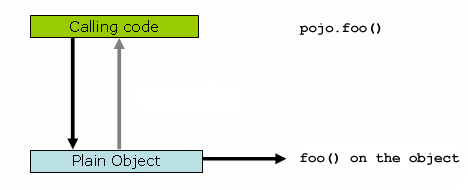[toc]
通常来说Spring AOP有两种代理方式,一种默认的JDK代理,只能代理接口,一种是CGLIB代理,可以代理具体的类对象。
SpringAOP默认为对AOP代理使用标准的JDK动态代理。如果业务对象不实现接口,则使用CGLIB。
如果使用CGLIB,要注意对于CGLIB,不能advice final方法,因为它们不能在运行时生成的子类中被重写。
由于Spring的AOP框架基于代理的特性,根据定义,目标对象内的方法调用不会被拦截。对于JDK代理,只能截获对代理的公共接口方法调用。使用cglib,可以截获代理上的公共和受保护的方法调用(如果需要,甚至可以截获包可见的方法)。
如果需要拦截在目标类内的方法调用甚至构造函数,那么考虑使用Spring驱动的native AspectJ weaving,而不是Spring的基于代理的AOP框架。
要强制使用CGLIB代理,请将aop:config元素的proxy target class属性的值设置为true,如下所示:
<aop:config proxy-target-class="true">
<!-- other beans defined here... -->
</aop:config>要在使用@Aspectj auto proxy支持时强制cglib代理,请将aop:aspectj-autoproxy元素的proxy-target-class属性设置为true,如下所示:
<aop:aspectj-autoproxy proxy-target-class="true"/>SpringAOP是基于代理的,那什么是代理呢?
首先我们考虑一个最简单的POJO对象:
public class SimplePojo implements Pojo {
public void foo() {
// this next method invocation is a direct call on the 'this' reference
this.bar();
}
public void bar() {
// some logic...
}
}如果直接调用该对象的方法,则运行原理如下所示:
调用方法如下:
public class Main {
public static void main(String[] args) {
Pojo pojo = new SimplePojo();
// this is a direct method call on the 'pojo' reference
pojo.foo();
}
}如果是调用代理,则运行原理如下:
调用方法如下:
public class Main {
public static void main(String[] args) {
ProxyFactory factory = new ProxyFactory(new SimplePojo());
factory.addInterface(Pojo.class);
factory.addAdvice(new RetryAdvice());
Pojo pojo = (Pojo) factory.getProxy();
// this is a method call on the proxy!
pojo.foo();
}
}本文的例子请参考aop-proxy
更多教程请参考 flydean的博客

